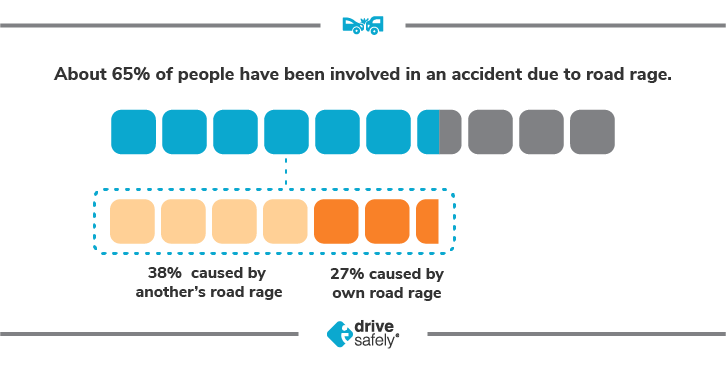How to Talk to Family about Road Rage
Does this scenario sound familiar? You and your spouse are driving to your child’s soccer game. You are running a little late…again. Your spouse weaves around cars on the highway, honking at a car in the passing lane, yelling at them to get out of the way. They follow the car closely until it changes lanes. You grip the door handle, close your eyes, and try to go to your happy place.
This type of road rage behavior is actually pretty common. In a recent driving behaviors study we conducted, 49% of the respondents said they experience road rage. (Twenty-five percent said they experience it often and 24% said they experience it sometimes.)
If you have an aggressive driver in your life, we have some advice for how to talk to them about road rage and how to help them keep their cool on the road.
The Impact of Road Rage
If you’ve ever felt anxious about a family member or friend’s road rage, you are not alone. Sixty-five percent of people we surveyed said they have felt unsafe due to another driver’s road rage.
Road rage is dangerous because it clouds thinking and judgment.

Aggressive drivers tend to:
Make dangerous decisions
Be impatient
Get annoyed easily
Tailgate
Prevent others from passing
Give others angry looks
Make obscene gestures
Honk unnecessarily
Not use signals
Yell and threaten
Slam on their brakes
What Can Road Rage Lead To?
Road rage actually causes more road rage. Seventy-nine percent of people we surveyed said that anger at other drivers on the road was more likely to trigger road rage than anxiety about factors not directly related to driving.
Road rage also increases the likelihood of getting into a car accident. Our study found that 65% of those surveyed had been involved in an automobile accident caused by their own (27%) or another driver’s (38%) road rage.

What Personality Type Has Road Rage?
Aggressive drivers tend to have one thing in common: anger. Someone who tends to lose their cool easily will also likely show a tendency toward road rage.
The American Psychological Association identified five key differences between what they call “high-anger drivers” and “low-anger drivers.”
High-anger drivers tend to:
Behave in a hostile way. High-anger drivers often want revenge when they feel another driver has wronged them on the road.
Be risk-takers. High-anger drivers tend to run red lights more often, switch lanes abruptly, and speed.
Get angry fast and easily. High-anger drivers might call other drivers names and honk at other cars.
Get in accidents more often.
React with frustration and anger in other situations, not just behind the wheel.
Why is this important to know? If you can address the root cause of the road rage (anger), you have a better chance of changing behavior.
How Do I Talk to Someone with Road Rage?
Talking to someone you love about their road rage is a difficult conversation to have, but it’s an important one. There’s no right or wrong way to talk about road rage, but you might want to consider a few of the following strategies for broaching such a sensitive subject.
How to talk to someone with road rage:
Start with empathy. This is hard to do, but try to imagine what is going on to cause their aggressive behavior. The road rage is likely a symptom of something else that’s upsetting them. It might be a stressful job, being late for an appointment, or an argument with a friend that is the real cause of their intense feelings.
Wait for them to be calm (and not driving) to have a conversation. Bringing up a sensitive topic when someone is in the heat of a road rage moment is not going to go well.
Use “I” statements. Instead of accusing them with lots of “you” statements (“You are driving so aggressively!” “You are going to cause an accident!”) In a calm voice say, “when you yell at other drivers it makes me feel scared.”
Stay calm. Help the aggressive driver calm down, by saying something like “It’’s okay if we’re a little late. Let’s take a few deep breaths.” Modeling calming behaviors will influence them more than screaming at them to slow down.
Defensive Driving Changes Driving Behavior
Our study showed that, of those who changed their driving behavior, 47% said it was because they took a defensive driving course and/or installed a dashboard camera. Our defensive driving course teaches drivers why road rage is dangerous and how to avoid driving aggressively.
Our course offers these ideas for driving defensively (instead of aggressively):
Try planning your trip ahead of time, so you don't feel rushed.
Let aggressive drivers pass right by you. Don't make eye contact or challenge them.
Try not to take out your stress on others.
Pay attention to what you're doing, not how much everyone is annoying you.
Don't cut people off or fail to use your signals.
Don’t honk just to express your anger.
Don't try to prevent people from passing or getting in your lane.
When your light turns green, look out for cars running their red light before you go.
One last tip: If someone you love is prone to road rage, and you know they are having a stressful day, offer to drive. Put on some calm music, take a few deep breaths, and try to enjoy the ride.
These suggestions are easier said than done sometimes, but it’s important to remember that lives are at stake. Road rage is no joke. When it comes to driving (and life), it’s always better to take the high road (and let people pass you).
Is road rage getting stressing you out? Calm down with some nice defensive driving.






